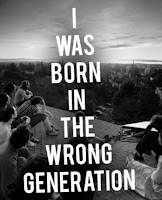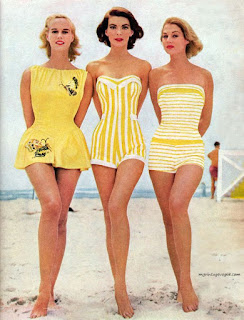
Style Clothing became an important part of culture in the 1950s, with the country going through many societal and cultural changes. It would showcase one's place in society more so than ever before and became a way to express conformity
and individual identity.
Fashion started to emphasise conformity in the way people should look. Women were sold on a certain body shape that would best fit the latest fashions and that shape was a thin waist with defined hips and a larger but very defined and shapely bust.

Fifties fashion also helped to define a woman's place in society. Five different types of outfits began to emerge for women during the decade, each with a definite and rigid purpose. Women's clothing could for the first time be easily sorted into clothing for housework or lounging around the home, going out to run errands or conduct business, maternity wear, party-appropriate clothing for social gatherings, or, for women of a lower socio-economic station than the emerging middle class, work uniforms. These different styles were meant to impress and please others including husbands, neighbors, friends and employers, with much less emphasis on whether these fashions expressed the individual identity of the women who wore them.
 style was used to set a common standard of look.
style was used to set a common standard of look.
This meant that not many choices of dramatically different
styles were available throughout the decade. A lot of clothing
was similar in shape and silhouette but varied in color, pattern
or type of fabric.
For men, fashions changed very little throughout the decade. Choices were suits, sport coats, slacks, sweaters, or casual wear all in similar fabrics and styles. Occasionally bolder patterns might emerge for casual wear, but business clothing remained largely unchanged during the fifties. Work clothing for laborers was usually in the style of the military, because a majority of the men at the time had served in the armed forces or were still a part of the military.
Around the middle of the decade a separation between child
and adult styles began and the gap was filled by teenage clothing.
Resulting from the economic boom and baby boom coinciding,
teenage style, culture, and consumerism became a major part of
society for the first time in recent history.
These are some of the things you may have seen advertised Below and how much clothes were in the 50's
Polo Shirts 99 cents New Hampshire 1950
Chino Pants $2.98 New Hampshire 1950
Boys Shoes $4.95 New Hampshire 1950
Nylon Stockings 2 pairs for a dollar New Hampshire 1950
Men's Suits $45.00 Wisconsin 1954
Ladies Full Length Cashmere Coat $59.00 California 1959
Men's All Wool Suits $28.90 Ohio 1957
Square dance Cotton Check Dress $3.29 California 1959
Ladies Sandals $2.95 New Hampshire 1950
Men's Dress Shoes $13.98 Wisconsin 1954
Children's Shoes From $2.95 Wisconsin 1954
Short Spring Coats $9.88 California 1959
Girls Dresses $2.98 Texas 1956
Denim jeans 13 1/2 ounces $2.49 Michigan 1957
Boys shirt $1.10 New Jersey 1956
Boys Denim Jeans $2.49 Michigan 1958
Boys winter jacket $7.80 New Jersey 1956
Leather Jacket $4.88 New Jersey 1956
Men's shirt $3.99 New Jersey 1956
Women's handbag $1.32 New Jersey 1956
Women's skirt $4.95 New Jersey 1956






































